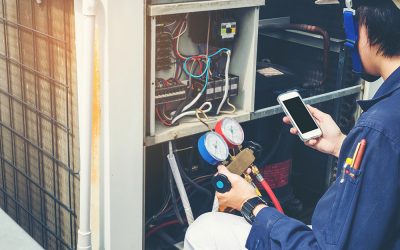Heating, ventilation, and air conditioning systems play an integral role in a home or office. They are two systems in one. The heating system, otherwise known as the furnace, warms the house, something most homeowners find pivotal during the cold months of winter. Ventilation and air conditioning systems make the indoor environment palatable during the summer months. Furnace and AC inspections will ensure that maintenance is done to perfection in order to continue to make your house livable.
Spring and fall are busy times for most home and property owners. During the spring, you should check your AC to be sure it is prepared for summer weather. Likewise during the fall, you have to tune up the furnace so it’ll be ready for winter.

The Importance of HVAC Maintenance
- For Your Family Safety
As noted above, this system saves you from the vagaries of weather. You cannot brave the winter temperatures without a furnace. Maintaining the systems keeps them in working conditions. Cases of system breakdowns and injuries are minimized.
A defective system can release poisonous gases such as carbon monoxide. This gas can prove fatal especially if it is released while you and your family are asleep. At least 15,000 people seek emergency health services due to carbon monoxide emissions. To keep the indoor air quality in tiptop condition, you should maintain your system at all times.
- To Maintain Warrant
Manufacturers are very cautious about the maintenance of a system. Some recommend professional product maintenance of the unit. Any attempts to maintain it on yourself can void the warrant. You must invest in furnace inspection and HVAC maintenance on a regular basis. If you neglect the system, you will lose the warranty. The manufacturer will not be liable for any maintenance efforts of the unit once the warrant becomes void.
- To Save on the Energy Bills
Defective systems are inefficient; they will consume more energy that they should. You will pay more for your fuel costs and other utility bills. The system will cause an unnecessary escalation of running costs. Proper furnace maintenance will lead to lower utility bills because the system will burn fuel efficiently.
- The System Will Work Optimally
You cannot afford to keep a system that is not doing its work efficiently. A family is at risk of developing colds and cold-related conditions if your AC is not working. A well-maintained system will have clear airflows. The risk of condensation and carbon monoxide poisoning is minimized. High summer temperatures will harass you and your family if your AC is not working. Optimal performance means it will consume less and give you better services. It will not consume more fuel than it ought to.
- Minimal Emergency Breakdown
A checked and tuned up system has a low likelihood of breaking down. A system that is checked at the right time will be good to go throughout the season. Breakdowns are costly for you. You will need to call an emergency HVAC repair. The cost of repairing a broken system is more.
You can also discover problems before they escalate. Maintenance repairs can cost less compared to fix-up repairs that often deal with mechanical failures. They can also involve expensive replacement parts.
- The System Will Last Longer
Research shows that most mechanical devices last longer when you maintain them regularly. If you check the igniter, flame sensors, burners, heat exchangers, support for vent pipes, condensers, and gas pressure, you will be sure that your system will be in pristine conditions for long. You can detect gas leaks before they can damage the heating system. If there is any inefficiency in combustion, an analysis will help you discover it immediately.
- It Is Good For the Environment
Your HVAC system should last at least 10 years. Poorly maintained systems will last slightly less than that. You will buy a new unit to replace a system that should be operational up to its 15th birthday. If more people continue that trend, the overall carbon footprint will be massive. It will be bad for the ecosystem. Every maintenance effort goes a long way in helping your system emit less smoke and consume less energy, too. Broken systems end up in landfills, which makes maintenance of a system a good activity.
When Is Cleaning Necessary?
Cleaning is an important task. It helps clear out any dirt and debris from your filters, ducts and the registers in general.

Regularly
Clean the system routinely. Schedule your cleaning every three months so that you do not miss an episode. Clean the system before the start of every season.
When You See Dirt or Clogs in the Ducts
When inspecting your system, if you see excessive dirt or debris, you should clean it up immediately. It may not ever reach critical levels, but dust and debris make the filters and overall airflow inefficient.
DIY Cleaning/Maintenance Tips
You can develop a DIY cleaning schedule for your system. If you find it technical, you can Google HVAC service near me to get options. If you are a fan of air condition and heating service inspection, you can follow this checklist.
When checking an air conditioner, ensure you have a screwdriver and vacuum cleaner. Shut off the power to start your cleaning routine.

Clean the Debris and Dust in the Registers
You can easily unscrew the filters and the blower. It is easier to reach the inner components when you open it. Sensors and igniters are sensitive; dust them without touching them with your hands.
Replace Old and Dysfunctional Filters
Check the filters. If they are past their recommended time, remove them. Replace them with original parts. If the manufacturer does not make the filters, consider updating the system.
Free the AC off Any Debris
You can unscrew the top part to remove any debris lodged around the unit. Anything that can interfere with airflow, clean it up.
Clean the Fins and the Evaporator Coil
You can use a soft brush to dust off any dirt. Vacuum the fins where necessary. Ensure that they are clean and straightened back. The evaporator drain is a bit technical. If the system is not cooling, the drain is the first culprit.
Listen To Unusual Noises
After this inspection and tune-up exercise, you can screw and bolt every unfastened part of the system. Put the power back on and start the system. Check if the system is working all right. Listen for any unusual noises. If the system is working fine, congratulate yourself for a job well done.

Conclusion
A good HVAC system starts with a scheduled maintenance plan. Inspection, cleaning, and tune-ups can make the system work better for longer. You will pay less for optimal services. You will also keep your product warrant in place. Fortunately, for you, you can always do it yourself. If you are not confident enough, searching HVAC service near me is a good start. You can get a dependable heating service professional near you.

